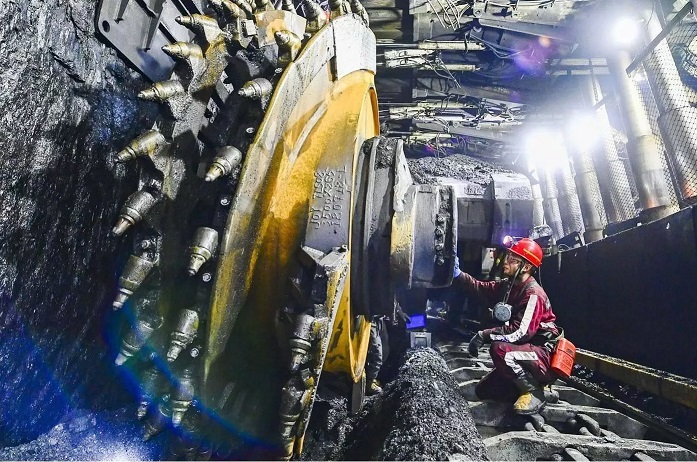 |
|
|
Over the past two months, energy shortages have spread across China's steel, aluminum and cement manufacturing hubs. Coal prices have skyrocketed and may increase further as winter approaches. Coal is an important fuel, contributing to the production of nearly two-thirds of the electricity of the world's second largest economy.
Power shortages this winter could be the worst since 2010 and will increase the risk of inflation, recession and growth pressure on the Chinese economy. The world's largest energy consumer has to tackle power shortages and limit skyrocketing price hikes in energy prices, while keeping climate goals on track.
To get out of this crisis, China may even have to import coal from Australia and the US amid relations with these two countries that have not changed positively. China is also ignoring climate targets to revive old and dirty mines, to keep electricity prices under control for industrial zones.
Some forecasts show that the gap between supply and demand of coal in China this year will be around 350-400 million tons.
China's energy-intensive industries are said to face many difficulties. The output of industries such as steel and cement may decrease by 30% this year.
Not only in China, the global energy crisis is causing great difficulties for many countries, including Vietnam.
Energy prices increase
 |
|
|
European countries are facing a gas price crisis, which began escalating in the early autumn of this year. Spot-delivered gas prices have spiked, hitting $2,000/1,000 m3 due to concerns about low storage capacity and increased demand for post-pandemic recovery. Europe's underground gas storage facilities have had their lowest occupancy rates in years.
This has hit energy-dependent industrial operations, while consumers are also facing soaring bills as winter approaches.
Russia has boosted gas supplies to Europe. However, this has not led to a sharp drop in gas prices because the international gas market is still difficult and the competition between regions for liquefied natural gas is still high.
In the US, the relentless rise in gasoline prices to a seven-year high is placing an undue burden on families and small businesses. This situation has put US President Joe Biden under increasing pressure from public opinion.
Many Democrats in the Senate have called on President Biden to act to stem the soaring gas prices by considering releasing barrels from the nation's emergency oil stockpile.
In the long term, energy shortages are still possible. Some countries have recently restricted investment to boost output. Investors are less supportive of long-term projects because they consider the consequences of the climate crisis.
In India, gasoline prices have risen to a record high. According to top Wall Street banks, the era of low oil prices will be over. Instead of increasing supply, businesses have to limit spending, leading to a lack of investment in new production facilities. This will keep oil prices high for a long time.
Goldman Sachs predicts oil prices will rise to $85/bbl in 2023. BNP Paribas forecasts that crude oil prices will reach $80.
Vietnam in trouble
 |
|
|
The State Bank Governor Nguyen Thi Hong explained to a recent National Assembly session that inflation pressure in 2022 is not low. She said that the Covid-19 pandemic has seriously affected people's lives and production and business activities of enterprises.
According to Hong, the world economy has gradually recovered along with the increase in vaccination rates. Commodity prices on the world market have increased. Petrol prices rose 55.2% in September compared with the previous year. Developed countries are experiencing historically high inflation. The US recorded inflation up to 5.3% in September. With the large openness of Vietnam's economy, import-export turnover/GDP of 200%, Vietnam is under pressure and risks of import inflation.
A representative of a securities company said that the devaluation of the VND and inflation in Vietnam will occur at the end of 2022 and early 2023. In fact, it is inevitable.
According to this expert, gasoline prices continue to increase in the context of opening the economy, and increasing demand for travel, trade and freight. This is also a factor that pulls inflation up and negatively affects Vietnam's growth recovery.
Experts from the World Bank (WB) said that Vietnam is facing many obstacles in restarting the economy, after a long period of social distancing. Inflation needs to be watched, as recovery in domestic demand amid rising world energy prices could put upward pressure on prices. The health of the financial sector also needs to be closely monitored.
However, according to the World Bank, many signs show that the economy will continue to improve and growth will accelerate in the coming months. Fiscal policy intervention will be effective, including tax exemptions and reductions, speeding up the implementation of public investment projects and providing social assistance to those in difficulty.
Accordingly, the value-added tax reduction package in November and December 2021 for transport, tourism, accommodation, catering and entertainment service businesses has been approved, which is expected to help boost domestic demand in these industries.
As the economy reopens and the number of new Covid cases increases, speeding up vaccinations and continuing Covid testing and isolation measures will help avoid another outbreak. However, a new wave may force the Government to apply new restrictive measures to protect people's lives.
Duy Anh

Vietnam sees big opportunities in wind energy
Vietnam’s commitment to increasing its energy capacity using renewable sources and favourable macroeconomic conditions may create valuable opportunities for wind investors and developers.

Vietnam to unlock mechanisms to attract private power investors
The Government of Vietnam is building open mechanisms to mobilise private investment in power projects, especially in renewable energy (RE).